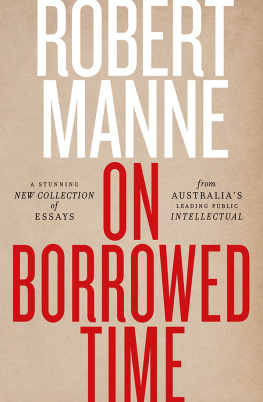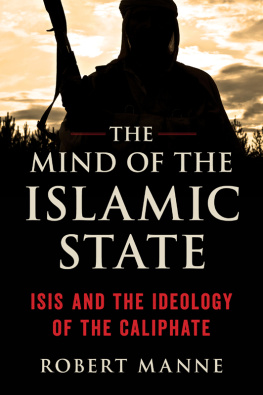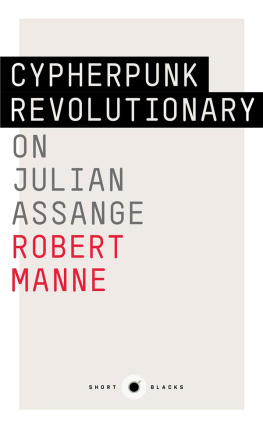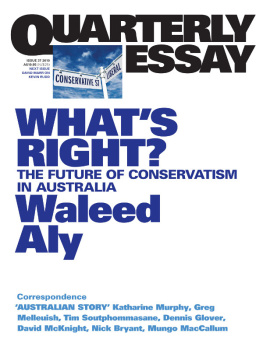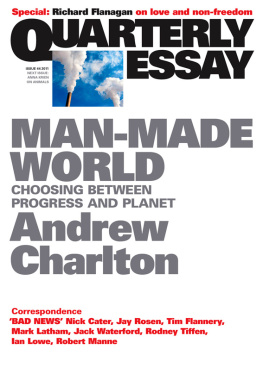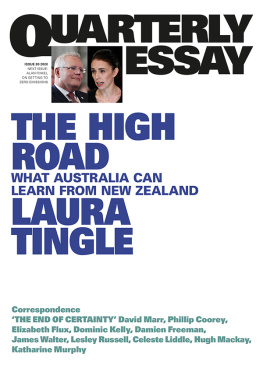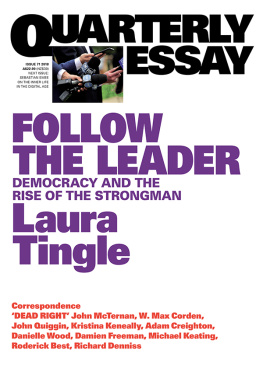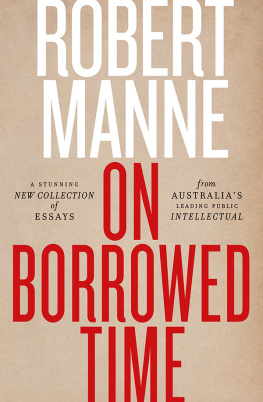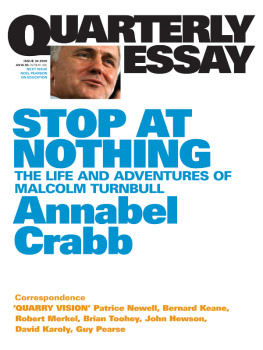Bad News: Murdochs Australian and the Shaping of the Nation
Robert Manne
When I decided to write this essay, the Murdoch global media empire was in rude health. By the time it was completed, the empire was badly weakened. The collapse of an empire is frequently triggered by a small event. In this case it was the revulsion felt by the British public after the discovery that reporters at the Murdoch tabloid News of the World had hacked into the mobile phone of a kidnapped thirteen-year-old girl later found murdered. Because of a Guardian investigation, the British public learned that phone hacking was a common practice at News of the World. Les Hinton, the chairman of News International at the time of the hacking, resigned. Both Rebekah Brooks, the head of Murdochs newspaper division in the United Kingdom, and Andy Coulson, a former editor of News of the World , were arrested. Conspiracies often begin to unravel when conspirators turn against each other. James Murdoch, chairman of News International, gave evidence to a House of Commons committee. James assured the committee that he had believed only one journalist was involved in phone hacking when he signed a cheque for 700,000 in favour of a victim. Two disgraced News International employees, Tom Crone and Colin Myler, claimed that this was not true. They had shown him an email that revealed a widespread practice of hacking at News of the World. If James Murdoch is unable to disprove their allegation, his future at News is in doubt. Even more seriously, if it can be shown that Rupert Murdoch was told about the phone hacking by his son, his credibility would not easily recover. As I write, Rupert Murdochs control of his empire is shaky.
Rupert Murdoch is one of the most powerful people in the English-speaking democracies. His genius has been to discover different ways in which his two passions a desire for money and a thirst for power can be combined. In the United States, Fox News is not only one of his most profitable businesses. It has gained a great influence over the choice of Republican Party candidate for the presidency and has injected into the bloodstream of American political culture the poison of a strident populist conservatism. In Britain, somewhat differently, Rupert Murdoch has used his newspaper power to instil a fear into prime ministers and leaders of the Opposition, in part at least to advance his other, more lucrative, commercial interests. In Australia, the country of his birth for which he seems to feel an especial responsibility, he has discovered how to use the 70 per cent of the national and statewide press he owns1 to ensure that the values drawn from his right-wing political philosophy remain dominant within the political mainstream. Murdoch has presented a major problem for the democratic cultures of three Anglophone countries. In America it is Fox News, in Britain News Internationals tabloid culture, and in Australia the direct political influence of his newspapers. For the moment Murdochs power has diminished, whether permanently or temporarily it is too early to say. Politicians who once courted him are now in flight. This situation provides an unexpectedly propitious climate for the evaluation of the political influence and the character of his most important political asset in this country, the broadsheet he created in 1964, the Australian.
I took the decision to write this essay in September 2010. I had long been concerned with the role the Australian had played over the question of action on climate change. By then I was also convinced that this newspaper, which had played an important part in the unravelling of the Rudd government, would not rest until it saw the end of the Gillard government and the destruction of the LaborGreens alliance. However, there was more to the decision than this.
The Australian is in my view the countrys most important newspaper. Under Chris Mitchell it has evolved into a kind of broadsheet perhaps never before seen here. It is an unusually ideological paper, committed to advancing the causes of neoliberalism in economics and neoconservatism in the sphere of foreign policy. Its style and tone are also unlike that of any other newspaper in the nations history. The Australian is ruthless in pursuit of those who oppose its worldview market fundamentalism, minimal action on climate change, the federal Intervention in indigenous affairs, uncritical support for the American alliance and for Israel, opposition to what it calls political correctness and moral relativism. It exhibits distaste, even hatred, for what it terms the Left, and in particular for the Greens. It is driven by contempt for its two natural rivals, the Fairfax press and the ABC, one of which it seems to wish to destroy altogether, the other of which it seeks to discredit for its supposed left-wing bias and to reshape. Both the Fairfax newspapers and the ABC are constantly attacked and belittled by the Australian. Yet at least until the Murdoch empire was weakened in early July 2011, for the most part they turned the other cheek.
The Australian is a remorseless campaigning paper; in recent times against the Building the Education Revolution program and the National Broadband Network. In these campaigns its assigned journalists appear to begin with their editorially determined conclusion and then to seek out evidence to support it. The paper is also unusually self-referential and boastful, heaping extravagant praise upon itself for its acumen and prescience almost on a daily basis, never failing to inform its readers that it was the first to report something or the only paper to provide real scrutiny or intelligent interpretation. Related to its boastfulness is the Australian s notorious sensitivity to criticism. It regularly explodes with indignation and rage when criticised. It also bears many grudges. The Australian never forgave former Victorian police commissioner Simon Overland, who once had the temerity to complain about its behaviour on the eve of an anti-terrorist raid in Melbourne. It did not rest until his career was ruined. Not even then. It also has an intensely aggressive culture, described to me by close observers as bullying or swaggering or macho. Chris Mitchell is determined that his paper will be talked about, a style that his editor, Clive Mathieson, described vividly in an interview with me as elbows out. In no other newspaper is the spirit of the editor so omnipresent, either directly through the editorials the daily morning missives to the nation which he inspires or indirectly throughout its pages. Mitchell is frequently interviewed by his own journalists. He uses those he most trusts to fight his battles with his many enemies. In a recent profile of him written by Sally Neighbour for the Monthly , David Marr described his uncanny ability to personalise everything he deals with as his peculiar genius. Because of the charismatic authority over his journalists exercised by Mitchell, and because of the costs that are paid by anyone in his paper who defies him, one very senior journalist likened the atmosphere inside the Australian to that of a cult.
The Australian is this countrys only genuinely national general newspaper, with a readership in every state and territory and in the capital cities, the regional towns and rural areas. Although its weekday sales are small somewhere between 100,000 and 130,000 it is extremely well resourced by its proprietor, able to employ many of Australias best journalists. As a consequence, as I learned in interviews with Senator Bob Brown and with senior members of the Gillard government, the Australian now dominates the Canberra press gallery not only in the number of journalists employed at some press conferences half of those attending are from the Australian but also in the aggression its reporters display and their capacity for teamwork in pursuit of their prey. Because of the dominant position it has assumed in its Canberra coverage, the Australian influences the way the much more widely read News Limited tabloids, like the Daily Telegraph and the Herald Sun , report national politics and frequently sets the agenda of commercial radio and television and the ABC, even the upmarket breakfast program on Radio National. The Australian is in addition the only newspaper that is read by virtually all members of the group of insiders I call the political class, a group that includes politicians, leading public servants, business people and the most politically engaged citizens. Even those members of the political class who loathe the paper understand that they cannot afford to ignore it. Most importantly of all, as Mark Latham pointed out in a recent article in the Australian Financial Review , the Australian has now transcended the traditional newspaper role of reporter or analyst and become an active player in both federal and state politics. As such it exercises what Stanley Baldwin once called, in describing the influence of the great press barons of his era, power without responsibility.



